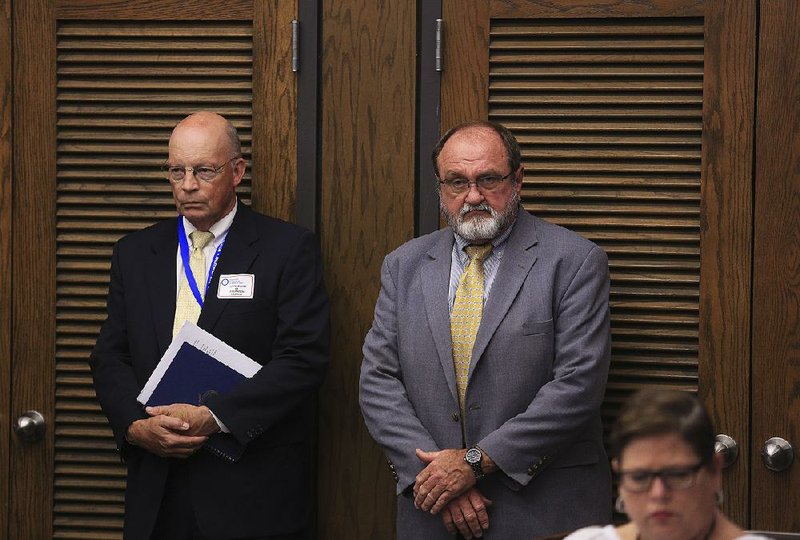A federal judge Wednesday declared the Pulaski County Special School District unitary in staffing, leaving the district under court supervision in only four other areas.
U.S. District Judge D. Price Marshall Jr. ruled on the matter about a month after the district submitted a motion to release it from further court supervision in the area of school staffing. Attorneys for black students known as the Joshua intervenors did not object to the motion.
With its motion, the district had attached a stipulated agreement between it and the intervenors that laid out a plan for the next three years, beginning July 1, to ensure racially desegregated schools. The plan includes adding financial incentives and possible involuntary teacher transfers.
"The Court approves and applauds the Joshua/PCSSD stipulation," Marshall's order said. "The District has substantially complied with Section L of Plan 2000 and provided a path for continued compliance and improvement during the next few years."
The Pulaski County Special district is a party in the long-running 1982 federal school desegregation lawsuit and is obligated to meet the provisions of its 2000 school desegregation plan. The 12,000-student district has met some of the plan requirements over time and has been released from court monitoring in some areas of operation, such as student assignments to schools, special education and gifted education.
The four areas in which the district must continue to report to the federal court are: eliminating racial disparities and inequities in school facilities; student discipline; student achievement; and district monitoring of its own operations.
The district is committed to showing the court that it is unitary in all areas, said Superintendent Jerry Guess.
"It's a great moment when we can demonstrate to the court and to the patrons that we are fair and unitary in our staffing," he said.
Plan 2000 staffing requirements revolved around recruitment of administrators; recruitment of teachers; incentives for early childhood, primary grade and secondary core teachers; and racially identifiable schools, or those in which the percentage of black teachers is more than 25 percent or less than 25 percent of the district's overall percentage of black teachers at the elementary level or at the secondary school level.
The stipulated agreement is the result of negotiations as far back as about 2013, said Allen Roberts, the district's attorney.
State Rep. John Walker, D-Little Rock, an attorney for the Joshua intervenors, did not return a message Wednesday. In May, he told the Arkansas Democrat-Gazette that he felt comfortable with the staffing agreement that he had worked out with the district, including the possibility of involuntary teacher transfers to achieve more racially balanced staffs.
Attorneys for both parties said in the stipulated agreement that the district's hiring, and assignment of principals and assistant principals meet the requirements of Plan 2000 and that the district has programs in place to help black educators become administrators.
Both parties also agreed that the district still needs to work in areas of nonprincipal administrators, in-school teaching staff, incentive programs and racially identifiable schools. In the stipulation, the district said it would "immediately begin [improving in those areas] and continue [improving] for the next three full school years."
As part of that, the district will change its new-teacher hiring process so that teachers recommended for jobs in early childhood, primary or secondary academic core subject areas must be reviewed and approved by the district's director of human resources or the deputy superintendent before being hired.
The agreement also calls for the district to set aside $100,000 annually for the next three years for a tuition-reimbursement program and for one-time financial incentives for involuntary teacher transfers, Roberts said.
The tuition-reimbursement program will reimburse the district's currently employed black teachers for courses they take to become state licensed in the grades or subjects in which the Joshua intervenors found a shortage of black teachers. Those areas are in the kindergarten-through-third grades, early childhood education programs and in the academic core courses in middle and high schools, another of the district's attorneys, Whitney Moore, has said.
The Pulaski County Special district would order involuntary teacher transfers as a way to desegregate the racially identifiable schools. Teachers who are involuntarily moved to other schools will each receive one-time payments of $1,000, according to the stipulated agreement.
There are currently eight schools that fall outside the acceptable racial-staffing ranges, according to Moore. That number has improved from 17 schools a year ago, Moore has said.
Overall, 24.85 percent of the district's elementary school teachers are black, and 24.55 percent of the middle and high school staffs are black.
The targeted range for black staffing at an elementary school is 18.64 percent to 31.06 percent. At the secondary level, the range is 18.41 percent to 30.69 percent.
Black teachers make up 17.61 percent of the staff at Crystal Hill Elementary, 42.92 percent at Harris Elementary, 33.35 percent at Landmark Elementary, 11.74 percent at Lawson Elementary, 52.21 percent at Fuller Middle School, 33.57 percent at Maumelle Middle School, 33.74 percent at Mills University Studies High School, and 14.76 percent at Robinson High.
Roberts added Wednesday that the number of racially identifiable schools is a moving target because of attrition, retirements, illnesses and such.
While the district continues to work on its staffing, it will also work to equalize its facilities, Guess said. The district is currently involved in an extensive building campaign. Also, on Tuesday, voters approved extending its 14.8 debt-service mills -- of its 40.7-mill property tax -- through 2048.
The district is building a new Mills High in southeast Pulaski County and a new Robinson Middle School in the western part of the county, both of which are to open in August 2018. The current Mills High will then be converted into a middle school to replace Fuller Middle, which will be demolished.
Administrators are using district funds, coupled with state desegregation aid, to complete the projects.
The Mills and Fuller projects are being done to help the district meet its Plan 2000 obligations, which include getting the district's older schools that serve high percentages of black students on par with its newer schools that have larger white populations.
The tax-extension will help the district finance more than $66 million in general-obligation bonds to expand a brimming Sylvan Hills High.
A Section on 06/15/2017

